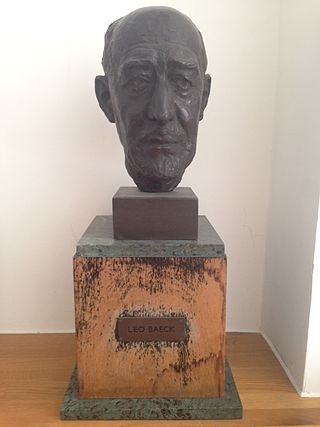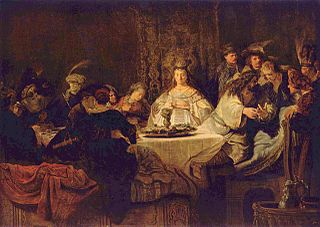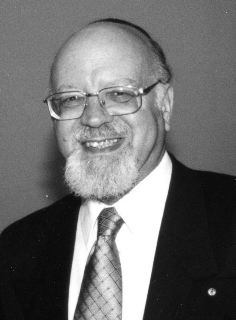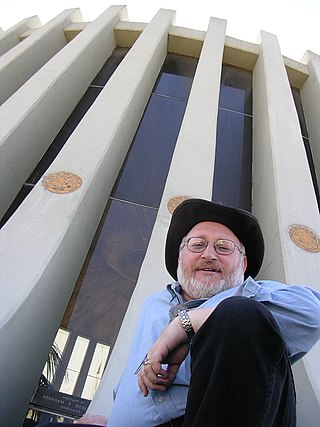Reeve Robert Brenner (born 1936) is an American Reform rabbi, inventor and author.
Brenner is a native of New York City. Since his ordination at the New York campus of the Hebrew Union College Jewish Institute of Religion in 1964, he has been a U.S. Army chaplain stationed in West Germany, senior staff chaplain at the clinical center of The National Institutes of Health(NIH), and served a number of congregations, including Bet Chesed in Maryland. As the first rabbi on the faculty of St. Vincent College and Seminary in Latrobe, PA, he taught Jewish religious thought and philosophy. His first major work, American Jewry and the Rise of Nazism, received the YIVO Jewish Scholarship Prize. His book, The Faith and Doubt of Holocaust Survivors, is the result of nine years of research conducted among survivors in Israel in order to explore the ramifications of the Holocaust upon their own personal belief and practice as Jews. This book was a finalist for the 1981 National Jewish Book Awards. Brenner is also the author of The Jewish Riddle Collection: A Yiddle's Riddles, and the books Jewish, Christian, Chewish, and Eschewish: Interfaith Pathways for the New Millennium an outgrowth of his extensive work with interfaith couples, and his defense of the reality of the Exodus entitled While the Skies were Falling.
Inspired by his young cousin, Janis Furmansky, who uses a wheelchair after an automobile accident, Brenner came up with a new sport called Bankshot while living in Israel in 1981. He wanted to develop a non-exclusionary basketball contest that entire families, including those with disabled members, could play. Sports Illustrated featured him in an article called "The Rabbi of Roundball; Rabbi Creates a new sport". He also serves as foundation president and founder of the National Association for Recreational Equality (NARE) and serves as the commissioner of the National Association of Bankshot Operators (NABO).
The Faith and Doubt of Holocaust Survivors" is without question an extraordinary achievement. When it was first published the book was clearly a classic, and now, in its revised and updated version it is even more valuable as a resource for our understanding and awareness of the thinking and feelings of those who went through one of the worst tragedies of human history.
The dictionary defines the word “classic” as a work of enduring excellence, something perfect of its kind; regarded as of first historical significance; having recognized and permanent value. To be classified as a “classic”, a book must be singular, irreplaceable and not possibly replicated. We know and acknowledge immediately that there are none others like it. For a Jewish book to be classified as a classic it must also address ultimate issues profoundly and it must be equal to the task, that is, equal to capturing and disclosing the enormity of the subject it addresses. The Faith and Doubt of Holocaust Survivors is a book that cannot be rewritten principally but not solely because the subjects are no longer with us. The generation studied for their experience of the trauma of the Shoah is no more. Besides as Prof. Alan Zuckerman has written, the book may be “the single most important research study of 20th century Jews and Judaism.”
Brenner has provided us with a rare genuine classic, meeting the above stated criteria. Replication is impossible for a study of Holocaust survivors who were teenagers before the war. Before, during, directly after and 30 years later, like stopping places at critical stages of their life’s journey, register the timeline of the longitudinal study. - Task, Arnold, Rabbi; book review in The Reform Jewish Quarterly, (Summer 2015)
Mind-boggling is my initial response to this magnum opus by Reeve Brenner. As I am one who claims respectable familiarity with Jewish sources, but only a layman's awareness of Catastrophic Uniformitarian theories about the cosmos, I find Reeve Brenner's focused compendium particularly challenging. His work presents as a thoroughly researched advocate for Immanuel Velikovsky's multi-works in advancing Catastrophic theories forcing the reevaluation of critical appraisals of what the biblical record really shows. This is especially so in regard to the narrative of the people of Israel's sojourn in Egypt and subsequent exodus in the time of Moses." - Landman, Nathan M, Rabbi; book review in The Reform Jewish Quarterly, (Summer 2016)

Judaism is an Abrahamic, monotheistic, and ethnic religion, comprises the collective spiritual, cultural, and legal traditions of the Jewish people. Contemporary Judaism having originated as an organized religion in the Middle East during the Bronze Age, and evolved from Yahwism, the cultic polytheistic religious movement of ancient Israel and Judah, around the 6th/5th century BCE, and is thus considered to be one of the oldest monotheistic religions. Along with Samaritanism, to which it is closely related, Judaism is one of the two oldest Abrahamic religions.
The term Judeo-Christian is used to group Christianity and Judaism together, either in reference to Christianity's derivation from Judaism, Christianity's recognition of Jewish scripture to constitute the Old Testament of the Christian Bible, or values supposed to be shared by the two religions. The term Judæo Christian first appeared in the 19th century as a word for Jewish converts to Christianity. The term has received much criticism, largely from Jewish thinkers, as relying on and perpetuating inherently antisemitic notions of supersessionism, as well as glossing over fundamental differences between Jewish and Christian thought, theology, culture and practice.
A rabbi is a spiritual leader or religious teacher in Judaism. One becomes a rabbi by being ordained by another rabbi—known as semikha—following a course of study of Jewish history and texts such as the Talmud. The basic form of the rabbi developed in the Pharisaic and Talmudic eras, when learned teachers assembled to codify Judaism's written and oral laws. The title "rabbi" was first used in the first century CE. In more recent centuries, the duties of a rabbi became increasingly influenced by the duties of the Protestant Christian minister, hence the title "pulpit rabbis", and in 19th-century Germany and the United States rabbinic activities including sermons, pastoral counseling, and representing the community to the outside, all increased in importance.

Holocaust theology is a body of theological and philosophical debate concerning the role of God in the universe in light of the Holocaust of the late 1930s and early 1940s. It is primarily found in Judaism. Jews were killed in higher proportions than other groups; some scholars limit the definition of the Holocaust to the Jewish victims of the Nazis as Jews alone were targeted for the Final Solution. One third of the total worldwide Jewish population were killed during the Holocaust. The Eastern European Jewish population was particularly hard hit, being reduced by ninety percent. While a disproportionate number of Jewish religious scholars were killed, more than eighty percent of the world's total, the perpetrators of the Holocaust did not merely target religious Jews. A large percentage of the Jews killed both in Eastern and Western Europe were either nonobservant or had not received even an elementary level of Jewish education.

Leo Baeck was a 20th-century German rabbi, scholar, and theologian. He served as leader of Reform Judaism in his native country and internationally, and later represented all German Jews during the Nazi era. After the Second World War, he settled in London, in the United Kingdom, where he served as the chairman of the World Union for Progressive Judaism. In 1955, the Leo Baeck Institute for the study of the history and culture of German-speaking Jewry was established, and Baeck was its first international president. The Leo Baeck Medal has been awarded since 1978 to those who have helped preserve the spirit of German-speaking Jewry in culture, academia, politics, and philanthropy.

Jonathan Henry Sacks, Baron Sacks was an English Orthodox rabbi, philosopher, theologian, and author. Sacks served as the Chief Rabbi of the United Hebrew Congregations of the Commonwealth from 1991 to 2013. As the spiritual head of the United Synagogue, the largest synagogue body in the United Kingdom, he was the Chief Rabbi of those Orthodox synagogues but was not recognized as the religious authority for the Haredi Union of Orthodox Hebrew Congregations or for the progressive movements such as Masorti, Reform, and Liberal Judaism. As Chief Rabbi, he formally carried the title of Av Beit Din (head) of the London Beth Din. At the time of his death, he was the Emeritus Chief Rabbi.
Emil Ludwig Fackenheim was a Jewish philosopher and Reform rabbi.

Jewish views on evolution includes a continuum of views about the theory of evolution, experimental evolution, the origin of life, age of the universe, evolutionary creationism, and theistic evolution. Today, many Jewish people accept the theory of evolution and do not see it as incompatible with traditional Judaism, reflecting the emphasis of prominent rabbis such as the Vilna Gaon and Maimonides on the ethical rather than factual significance of scripture.

The Religious Action Center (RAC) is the political and legislative outreach arm of Reform Judaism in the United States. The Religious Action Center is operated under the auspices of the Commission on Social Action of Reform Judaism, a joint body of the Central Conference of American Rabbis and the Union for Reform Judaism. It was founded in 1961.

The Liberal Jewish Synagogue, abbreviated as LJS, is a Liberal Jewish congregation and synagogue, located in St John's Wood, in the City of Westminster, London, England, in the United Kingdom.

Interfaith marriage in Judaism was historically looked upon with very strong disfavor by Jewish leaders, and it remains a controversial issue among them today. Many Jews followed the Talmud and all of resulting Jewish law Halakha until the advent of new Jewish movements following the Jewish Enlightenment resulted in the "Haskala"; in Halakha marriage between a Jew and a gentile is both prohibited, and also void under Jewish law.
Brad Hirschfield is a rabbi, author, and president of the National Jewish Center for Learning and Leadership (CLAL). Hirschfield was ranked three years in a row in Newsweek as one of America's "50 Most Influential Rabbis" and recognized as a leading “Preacher & Teacher” by Beliefnet.com.

Raymond Apple was an Australian and Israeli rabbi who worked in England and Australia and retired to Israel. He was the Senior Rabbi of The Great Synagogue of Sydney between 1972 and 2005. In this role, he was one of Australia's highest profile rabbis and the leading spokesman for Judaism in Australia.
Abraham Judah Klausner was a Reform rabbi and United States Army captain and chaplain who became a “father figure” for the more than 30,000 emaciated survivors found at Dachau Concentration Camp, 10 miles (16 km) northwest of Munich, shortly after it was liberated on April 29, 1945. He also cared for thousands more left homeless in camps as the victorious Allied Forces determined where they should go.
Walter Jacob is an American Reform rabbi who was born in Augsburg, Germany, and immigrated to the United States in 1940.
In Judaism, the traditional method of determining Jewishness relies on tracing one's maternal line. According to halakha, the recognition of someone as fully Jewish requires them to have been born to a Jewish mother. A person who is born to a non-Jewish mother and a Jewish father is regarded as Zera Yisrael and will only be accepted as ethnically Jewish and not as religiously Jewish. Thus, being Jewish through the paternal line typically necessitates conversion to Judaism to validate one's identity as a Jew in the fullest sense.
Rabbi Mark Leonard Winer is an American interfaith activist and scholar. In the 2014 UK Honours List published in the London Gazette on December 30, 2013, it was announced that Queen Elizabeth II had appointed Rabbi Winer a Member of the Order of the British Empire (MBE) for "promoting interfaith dialogue and social cohesion in London and the UK." The MBE was for Rabbi Winer's work in building community and interfaith relations during his tenure as Senior Rabbi of the West London Synagogue of British Jews, a Movement for Reform Judaism synagogue, from April 1998 to September 2010, and for his continuing interfaith leadership in London and the UK after his retirement from West London Synagogue through FAITH UK.

Laura Naomi Janner-Klausner is a British rabbi and an inclusion and development coach who served as the inaugural Senior Rabbi to Reform Judaism from 2011 until 2020. Janner-Klausner grew up in London before studying theology at the University of Cambridge and moving to Israel in 1985, living in Jerusalem for 15 years. She returned to Britain in 1999 and was ordained at Leo Baeck College, serving as rabbi at Alyth Synagogue until 2011. She has been serving as Rabbi at Bromley Reform Synagogue in south-east London since April 2022.

Rabbi Seymour Rossel is an American author, publisher, editor, educator, and founder of Rossel Books. Through his work in editing, writing, and publishing, he has influenced Jewish education and culture throughout the English-speaking world.

Lance Jonathan Sussman is a historian of American Jewish History, college professor, Chair of the Board of Governors of Gratz College, Melrose Park, PA and until summer 2022 the senior rabbi, now emeritus, at Reform Congregation Keneseth Israel (KI) located in Elkins Park, PA. He is the author of books and articles including: Isaac Leeser and the Making of American Judaism (1995) and Sharing Sacred Moments (1999), and a co-editor of Reform Judaism in America: A Biographical Dictionary and Sourcebook (1993) and New Essays in American Jewish History (2009). Since 2010 he has also published articles on Judaism and art.